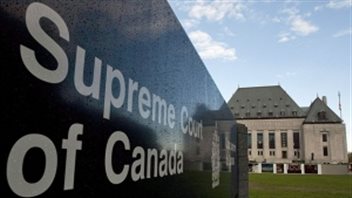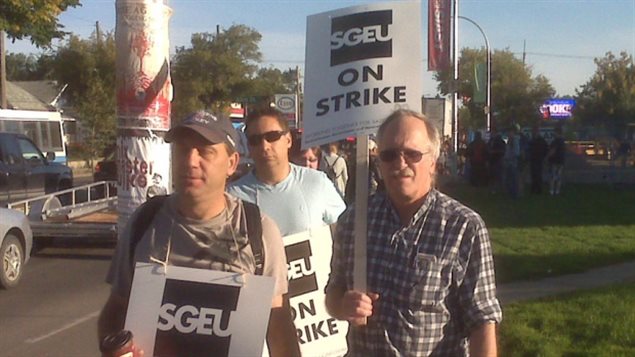The Supreme Court of Canada has recently handed down what is being viewed as a landmark decision for public sector workers who might be prevented from going on strike in a labour dispute.
The decision came in the case of the Saskatchewan Federation of Labour vs Saskatchewan. The high court ruled 5-2 that the right of labour to strike is a fundamental freedom protected in the Canadian Charter of Rights.
The ruling includes details of the requirements that are necessary in order for governments to designate a public sector job or service as “essential” and therefore not permitted to go on strike
The Ontario Public Service Employees Union (OPSEU) representing about 35,000 people, is currently about to negotiate which of its job classifications are deemed as “essential services” in Canada’s most populous province.
Warren “Smokey” Thomas is president of the Ontario public service union.
Listen
The case came as a result of new labour legislation in the western prairie province of Saskatchewan.
After winning power in 2007, the provincial “Saskatchewan Party”introduced essential services legislation, which said employers and unions had to agree on which workers could be deemed essential but if the two sides couldn’t agree, the government could simply decide on its own who was an essential worker.
The Saskatchewan law was enacted following major labour unrest and a strike by thousands of nurses in the province in 1999 and highway workers and prison officers in late 2006, early 2007.
Labour groups challenged the new legislation infringed on their Charter rights to strike, and appealed all the way to the Supreme Court. In its 5-2 ruling, the court affirmed the principle that any labour relations law that gives management a final say over the conditions of its workers violates the Canadian Charter of Rights and Freedoms.
Workers in a public sector union provide services to the public, and when contract negotiations break down, the union can legally go on strike and withdraw their services, or the government can lock them out.

In either case, some services provided are deemed as being essential to the safety and security of the public and they cannot legally be withdrawn by either side.
In some cases governments have declared a wide swathe of jobs as essential, or even the whole service as essential, and ordered the union back to work which very significantly reduces the union’s bargaining position.
Mr Thomas says the Supreme Court decision now creates much clearer rules and limits on government’s ability to arbitrarily declare who or what is an essential service. He hails it as a precedent setting victory for all public sector workers in Canada.
In the meantime however, the effectiveness of the Supreme Court decision may be limited. The Premier of Saskatchewan, Brad Wall, after learning of the decision said the province will attempt to modify the legislation to comply with the decision but then added, “If it looks like we cannot do that, then the only option we would have is to use the notwithstanding clause and simply say to the Supreme Court that we want to put public safety and welfare at the foremost, as our top priority for the people of Saskatchewan”.
The notwithstanding clause is laid out in Section 33 of the Charter of Rights and Freedoms. It allows the federal government or a provincial legislature to enact legislation to override several sections of the Charter that deal with fundamental freedoms, legal rights and equality rights.
Mr Thomas says OPSEU lawyers and labour unions all across the country are now intensely studying the situation and its implications.







For reasons beyond our control, and for an undetermined period of time, our comment section is now closed. However, our social networks remain open to your contributions.